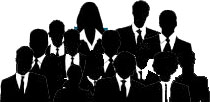The Arizona Republic : For most of us, legalese is a foreign language. That makes it doubly difficult when we try to discern both the complexities of Senate Bill 1070 and the judicial reasoning behind U.S. District Judge Susan Bolton's decision last Wednesday to block key provisions of the immigration-enforcement law from going into effect.
With that in mind, The Arizona Republic sought the assistance of two Phoenix attorneys, Timothy Berg and Mark Bolton (no relation to Judge Bolton), of Fennemore Craig. Hopefully, their translation of the judge's ruling will better inform Arizonans and others about a law that has stirred a national debate and protests.
• Interactive version of analysis
On July 6, the United States filed a lawsuit challenging the constitutionality of Arizona Senate Bill 1070. The United States requested that the court enjoin (i.e., block or stop) portions of the law from taking effect until the court could rule on the federal government's lawsuit.
The United States argued that under the Supremacy Clause of the U.S. Constitution, the power to regulate immigration belongs exclusively to the federal government, and that SB 1070 conflicts with federal immigration policy and is therefore pre-empted by federal law.
On Wednesday, the day before SB 1070 was to become law, Judge Susan Bolton enjoined several key parts of the law from taking effect pending a final determination on the United States' lawsuit. Gov. Jan Brewer has already appealed Bolton's order to the 9th U.S. Circuit Court of Appeals and indicated that she would appeal the 9th Circuit's decision to the U.S. Supreme Court, if necessary.
The 9th Circuit is not likely to rule on Brewer's appeal until next year, meaning the Supreme Court may not rule on the case until sometime in 2012.
Bolton conducted a section-by-section review of the bill and enjoined the four sections that she concluded the United States had a probability of successfully challenging.
What follows is an analysis of the judge's order.
- Timothy Berg and Mark Bolton
Section 2 (A) Enforcement
The law: Prohibits the state or any county, city, town or other political subdivision from limiting or restricting the enforcement of federal immigration laws to less than the full extent permitted by federal law.
Judge Susan Bolton's order: The United States did not make any arguments to have this provision enjoined. The provision took effect Thursday.
Section 2 (B) Arrests
The law: Requires law-enforcement officers to determine the immigration status of all individuals arrested in Arizona.
Bolton's order: The judge enjoined this provision. She determined that the provision requires law-enforcement officers to determine the immigration status of all individuals arrested in Arizona, not just those who are reasonably suspected of being in the country illegally. (Nearly 37,000 people were "arrested" last year in Tucson alone.)
According to Bolton, this provision conflicts with federal immigration policy as it will result in the harassment of lawfully present aliens and will burden federal resources.
Bolton points out that Congress intended to regulate immigration through a uniform national policy and prevent lawfully present aliens from being subjected to "inquisitorial practices and police surveillance." She held that this provision will "place lawfully present aliens (and U.S. citizens) in continual jeopardy of having to demonstrate their lawful status."
She also noted that many lawfully present aliens and U.S. citizens will not have readily available documentation to prove their legal status.
Additionally, Bolton concluded that the number of immigration-status inquiries that will emanate from this provision will direct resources away from the priorities and functions of federal agencies and that the provision therefore conflicts with federal immigration policy.
As a result of these conflicts, Bolton ruled that this provision is pre-empted.
Section 2 (G-L) Citizen lawsuits
The law: Allows legal residents of Arizona to sue any state official, agency or political subdivision for adopting a policy that restricts the enforcement of federal immigration law to less than the full extent permitted by federal law.
Bolton's order: The United States did not make any arguments to have this provision enjoined. The provision took effect Thursday.
Section 3 Documentation
The law: Makes it a state crime to violate federal alien-registration laws and creates criminal penalties.
Bolton's order: The judge enjoined this provision. In interpreting this provision, Bolton relies on federal law stating that the federal government's system for alien registration precludes states from enacting registration laws that conflict with or supplement federal law.
According to Bolton, by establishing state criminal penalties for a violation of federal alien-registration laws, SB 1070 supplements federal law. She also found that SB 1070 supplements the federal scheme in a way that conflicts with federal immigration policy, which envisions a uniform federal registration system. Therefore, the judge determined that this section is pre-empted.
Section 5 Soliciting work
The law: States that it is unlawful for an illegal immigrant to apply for work, solicit work in a public place, or perform work as an employee or independent contractor. The provision also imposes criminal penalties on aliens who violate this section.
Bolton's order: The judge enjoined this provision. She determined that the provision was pre-empted by existing federal law governing the employment of aliens. Specifically, the federal government chose not to impose criminal penalties on illegal immigrants who work in the United States. Instead, the federal government determined that it could best deter the hiring of illegal immigrants by imposing criminal sanctions on employers that do the hiring.
According to federal law, when a discrete area of a federally regulated field is deliberately left unregulated, there is a presumption that it was the federal government's policy to leave that discrete area unregulated. Therefore, state laws that regulate that particular subject are presumed to be pre-empted.
Bolton's order sets out an extensive list of areas in which the federal government has regulated the employment of aliens. The list does not include criminal penalties imposed on aliens who work in the United States. She concluded that SB 1070's imposition of criminal penalties places it in conflict with federal immigration policy and that this provision is pre-empted.
Section 5 Transporting or harboring
The law: Makes it illegal for an individual who is "in violation of a criminal offense" to (1) transport or move or attempt to transport or move an alien in a means of transportation in furtherance of the alien's unlawful presence in the United States; (2) conceal, harbor or shield or attempt to conceal, harbor or shield an alien in the state; and (3) encourage or induce an alien to come to or live in Arizona. To violate this section, the individual must also know or recklessly disregard the fact that the alien is unlawfully present in the United States.
Bolton's order: The judge held that this provision is not pre-empted by federal law, and it therefore went into effect on Thursday. The United States argued that this provision should be pre-empted because it impermissibly regulates immigration, an exclusively federal power, and because it violates the Commerce Clause of the U.S. Constitution. Bolton rejected these arguments.
The regulation of immigration is "a determination of who should or should not be admitted into the country, and the conditions under which a legal entrant may remain." According to the judge, this section of SB 1070 does not attempt to regulate who should or should not be admitted to the country and does not establish conditions under which a legal entrant may remain in the United States. Therefore, the provision does not regulate immigration.
Bolton also rejected the United States' argument that this section violates the Commerce Clause. A state violates the Commerce Clause when it regulates an activity that has a substantial effect on interstate commerce.
According to the judge, this provision governs conduct occurring only in Arizona and does not substantially burden interstate commerce.
Section 6 Removal
The law: Allows law-enforcement officers to make a warrantless arrest in which the officer has probable cause to believe that "the person to be arrested has committed any public offense that makes the person removable from the United States."
Bolton's order: The judge enjoined this provision. To enforce this section of the bill, law-enforcement officers would be required to understand which public offenses subject an individual to removal from the United States. According to the judge, this task is extremely complex. Under current federal law, this determination is made by immigration judges and federal appeals court judges.
In its arguments, the United States presented evidence that Arizona law-enforcement officers "have no familiarity with assessing whether a public offense would make an alien removable from the United States." Bolton determined that this provision would likely result in law-enforcement officers wrongfully arresting legal residents.
In doing so, Arizona law enforcement would impose a "distinct, unusual and extraordinary" burden on lawfully present aliens, which is in conflict with federal immigration policy that seeks uniformity and aims to prevent lawfully present aliens from being subjected to "inquisitorial practices and police surveillance." Bolton determined that this provision is pre-empted.
In seeking to enjoin these provisions of SB 1070 from taking effect on Thursday, the United States also had to prove that it would likely suffer "irreparable harm" if the laws took effect, that the "balance of equities" tipped in favor of enjoining the law and that an injunction was "in the public interest."
Bolton determined that the United States would suffer "irreparable harm" if SB 1070 became effective. Specifically, the United States' "ability to enforce its policies and achieve its objectives (would) be undermined by the state's enforcement of (laws) that interfere with federal law."
Bolton also determined that the "balance of equities" and the "public interest" favored enjoining the law. The judge held that enforcement of SB 1070 would burden legal residents of the United States and interfere with federal policy, neither of which serves the public interest. Additionally, she concluded that the state enforcing a pre-empted law does not further the public interest.
More on Berg and Bolton
Timothy Berg is managing partner of Fennemore Craig. He has practiced law for over 30 years, with a substantial part of his practice focusing on civil appeals. He has participated in the briefing or argument of more than 300 appeals before the various federal Courts of Appeals and the Supreme Court of Arizona and both divisions of the Arizona Court of Appeals. His appellate practice spans many areas, including employment law; medical malpractice; product liability; environmental, state and local taxation; business torts, real property and mineral rights; bankruptcy, and public-records and public-utilities law. Berg can be reached at tberg@fclaw.com.
Mark Bolton is an associate in the Phoenix office of Fennemore Craig. He is a member of the firm's government-relations-practice group. His practice is focused on government relations, with an emphasis on representing corporate- and trade-association clients on state legislative issues. Bolton also assists clients in their interaction with Congress and federal agencies. He can be reached at mbolton@fclaw.com.
Read more: Arizona Republic

MOBILE VERSION CLICK HERE
2 attorneys help make sense of legalese in SB 1070
4226 views
Other news
Notice: Undefined variable: pesq in /mnt/storage/sites/news.jornal.us/noticiasrel.php on line 11
Showing now
2 attorneys help make sense of legalese in SB 1070

Source: Editorial Staff
Saturday 07 August 2010
Notice: Undefined variable: tpalavras in /mnt/storage/sites/news.jornal.us/noticiasrel.php on line 50
Warning: mysqli_fetch_array() expects parameter 1 to be mysqli_result, boolean given in /mnt/storage/sites/news.jornal.us/footer.php on line 14











